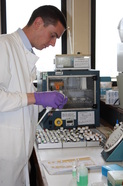The role of a novel inhibitory isoform of VEGF in ocular melanoma
Prof. Sarah Coupland
Prof. Bertil Damato
Dr Helen Kalirai
Dr Sarah Lake
Mr Andrew Dodson
Dr Martina Angi
Collaborators:
Dr Rowan Pritchard-Jones
Dr Maxine Emmett
Summary
In a subset of patients with uveal melanoma metastatic spread of the tumour cells to the liver occurs haematogenously. This metastatic process requires angiogenesis, which is promoted by Vascular Endothelial Growth Factor-A (VEGF-A). It has recently been discovered that there is a family of sister isoforms of VEGF-A, including VEGF165b, which inhibit angiogenesis. We have found that VEGF165b expression is significantly reduced in uveal melanomas showing chromosome 3 loss (i.e., monosomy 3). This suggests that VEGF165b expression may be a useful predictor of metastasis and may also have a mechanistic role to play in uveal melanoma metastasis itself. This study investigates the role of VEGF165b in the metastatic process and evaluates its use as a prognostic biomarker in uveal melanoma.
Prof. Bertil Damato
Dr Helen Kalirai
Dr Sarah Lake
Mr Andrew Dodson
Dr Martina Angi
Collaborators:
Dr Rowan Pritchard-Jones
Dr Maxine Emmett
Summary
In a subset of patients with uveal melanoma metastatic spread of the tumour cells to the liver occurs haematogenously. This metastatic process requires angiogenesis, which is promoted by Vascular Endothelial Growth Factor-A (VEGF-A). It has recently been discovered that there is a family of sister isoforms of VEGF-A, including VEGF165b, which inhibit angiogenesis. We have found that VEGF165b expression is significantly reduced in uveal melanomas showing chromosome 3 loss (i.e., monosomy 3). This suggests that VEGF165b expression may be a useful predictor of metastasis and may also have a mechanistic role to play in uveal melanoma metastasis itself. This study investigates the role of VEGF165b in the metastatic process and evaluates its use as a prognostic biomarker in uveal melanoma.




